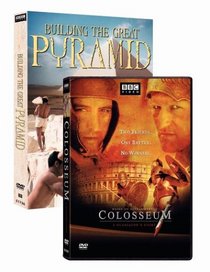| Genres: Television, Documentary Sub-Genres: Television, Documentary Studio: PBS Home Video Format: DVD - Color DVD Release Date: 03/16/2004 Release Year: 2004 Screens: Color Number of Discs: 2 SwapaDVD Credits: 2 Total Copies: 0 Members Wishing: 0 MPAA Rating: NR (Not Rated) Languages: English |
Search - Colosseum - A Gladiator's Story / Building the Great Pyramid on DVD
  | Colosseum - A Gladiator's Story / Building the Great Pyramid Genres: Television, Documentary NR 2004 |
Larger Image |
Movie Details
We're sorry, our database doesn't have DVD description information for this item. Click here to check Amazon's database -- you can return to this page by closing the new browser tab/window if you want to obtain the DVD from SwapaDVD.
Click here to submit a DVD description for approval.
|
Movie ReviewsGreat historical re-creations FrKurt Messick | Bloomington, IN USA | 05/29/2006 (5 out of 5 stars) "The documentary on the Colosseum (not quite a docu-drama, but done in a dramatic fashion that makes things a bit more interesting than a straight lecture piece) follows the story of Verus, one of the most famous gladiators in Roman history, and his friend (and occasional rival) Priscus. Verus and Priscus date from the inaugural games of the Colosseum, at that time known as the Flavian Amphitheatre, built by the Emperor Vespasian and opened by his son, Titus. Verus and Priscus were both slaves, caught in different parts of the empire during different wars, but ended up in the same quarry and had the same fate, to be selected and trained as gladiators for Rome.
The documentary works to dispel many of the false notions about gladiators and similar entertainments of the time. Many gladiators were not slaves, but rather willing participants after fame and fortune. Most gladiators did not die in the arena - in fact, survival chances were as high as ninety percent, and those who were injured got the best medical care in Rome. While animals were used as entertainment, often they would cower at the sound of the crowd and the overwhelming sense of being surrounded, which surely must have affected the human participants, too. The match between Verus and Priscus is one of the few recorded in detail in Roman literature, and the words and situations shown in this documentary come from the records of the time. The poet Martial wrote an extensive description of their match during the inaugural games; other archaeological and historical research provided insight to filling out the rest of the story. The acting is well done, and the sets and effects are convincing, with high production values. The documentary on the pyramids also shares high production values, and draws on archaeological evidence as well as interpretation. Again, preconceptions and misperceptions are dispelled - the majority of workers were most likely not slaves. However, the purpose of the pyramids remains a mystery, for even if the obvious intention is that of a pharoah's burial site, the ideas leading to pyramids (as well as the abandonment of such structures in favour of other kinds of burial sites) remains a matter of speculation and debate. Both of these documentaries give insight into worlds far removed from our modern times, and yet make sense in many ways - human nature and aspiration continues to share many common threads, even with people thousands of years ago. This is part of our own history." |

